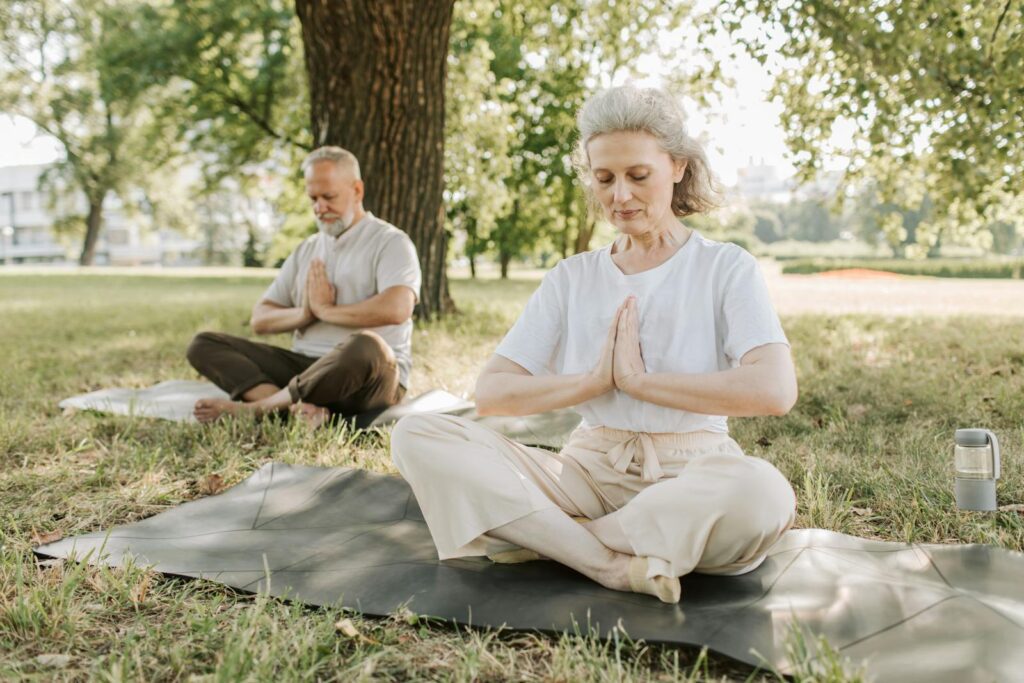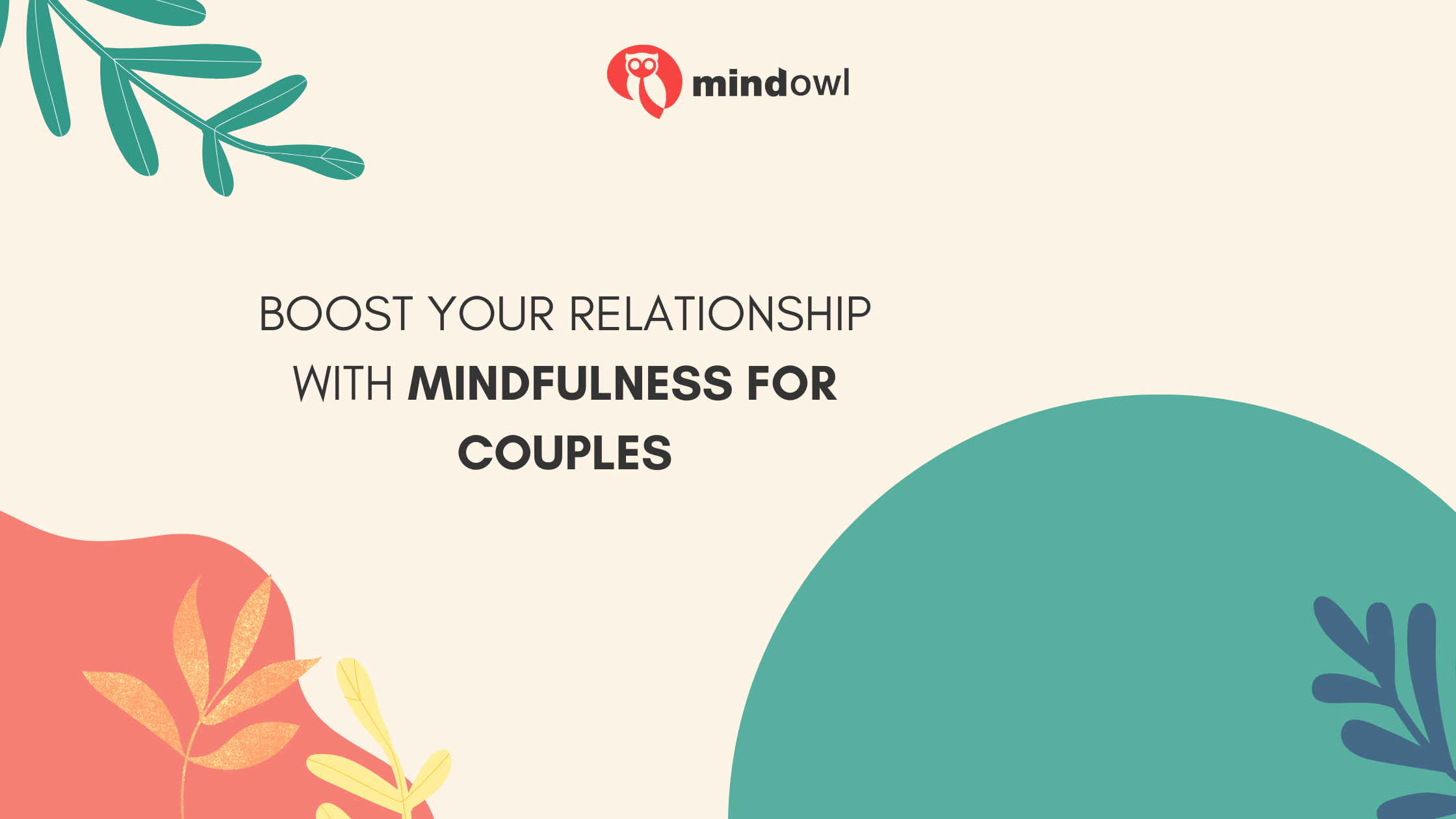Have you and your partner hit a rough patch, finding it hard to connect or understand each other as you used to? It’s not uncommon for couples to experience bumps along the way. One relevant fact about this topic is that mindfulness practice promotes healthy and happy relationships.
This article will explain how incorporating mindfulness can be the key to unlocking a deeper connection with your partner. From improving communication skills to fostering empathy, we’ve got tips and exercises designed to strengthen your bond.
Read on for insights on making your relationship flourish with mindfulness.
Key Takeaways
- Mindfulness helps couples understand and connect with each other better. It teaches them to listen actively, show empathy, and handle emotions in a healthy way.
- Practising mindfulness can decrease stress and anxiety in relationships. It changes how couples react to challenges, helping them respond calmly instead of with anger or frustration.
- Using techniques from Mindfulness-Based Relationship Enhancement (MBRE), like partner-focused loving-kindness meditation and daily rituals of connection, strengthens bonds between partners.
- Simple practices such as intentional eye contact, gratitude sharing, and mindful listening improve communication and increase feelings of love and appreciation.
- Research shows that mindfulness not only enhances the quality of relationships but also increases partners’ satisfaction by fostering kindness, patience, acceptance, and understanding.
Understanding Mindfulness in Relationships
Mindfulness in relationships refers to being fully present and aware of your partner. It involves actively listening, showing empathy, and acknowledging your partner’s feelings.
Definition of mindfulness
Mindfulness means paying full attention to what’s happening right now without wishing it were different. It involves being kind and forgiving towards both yourself and others. This approach is not just about sitting in silence; it’s a way of living that helps people notice the beauty in life’s tiny moments.
The practice encourages an attitude of openness and curiosity, even during tough times.
Mindness is like giving your brain a hug, said one meditation teacher.
The benefits are huge—it lowers stress, changes how our brains work, and helps us handle emotions better. Mindfulness exercises turn stressful thoughts into manageable bits. Stories tell of mindfulness-based stress reduction (MBSR) transforming lives by teaching patience, trust, acceptance, and letting go.
These skills don’t just make us feel happier; they change our relationships for the better too.
How it can benefit relationships
Practising mindfulness with your partner improves how you both handle emotions and understand each other. It helps you see automatic reactions and change them into thoughtful responses.
This builds a stronger bond by showing love and compassion in every action. Mindfulness also makes partners more aware of each other’s needs. Expressing feelings with honesty becomes easier, deepening the connection.
Mindfulness exercises for couples, like guided meditation or mindful communication, lower stress levels and open hearts to one another. Being fully present in these moments increases appreciation and gratitude for each other, leading to happier relationships.
Gratitude practice boosts connection and satisfaction between partners considerably. This way, practising mindfulness not only reduces tension but also fosters a deeper emotional link, making the relationship stronger over time.
Using Mindfulness-Based Relationship Enhancement (MBRE)
Components of MBRE
Mindfulness-Based Relationship Enhancement (MBRE) is a powerful tool to help couples strengthen their connection. It offers practical techniques that focus on improving communication, increasing empathy, and reducing stress.
- Gaining insight into interaction patterns: Couples learn to observe how they interact with each other, identifying both positive and negative patterns. This awareness helps them understand each other better and fosters a deeper connection.
- Partner-focused loving-kindness meditation: This involves meditating together with the intention of sending love and kindness to each other. It helps increase feelings of love, compassion, and understanding between partners.
- Structured couple dialogue: MBRE encourages couples to engage in meaningful conversations where they listen actively and speak honestly about their feelings, needs, and desires. This open communication builds trust and intimacy.
- Daily rituals of connection: Couples are encouraged to establish small daily practices that bring them closer together, such as sharing moments of gratitude, giving compliments, or simply spending quality time together.
- Mindfulness exercises: These include practices like breathing exercises and paying attention to the present moment without judgment. They help reduce stress and anxiety, making it easier for couples to deal with challenges calmly.
- Yoga poses for two: Engaging in physical activities together like yoga can enhance emotional connection through shared experiences. These activities promote closeness by requiring cooperation, coordination, and mutual support.
- Loving-kindness meditation towards others: Extending feelings of kindness beyond the couple bubble strengthens the relationship’s foundation by fostering a general sense of goodwill towards all beings.
MBRE teaches couples not just to coexist but to thrive by cultivating positive emotions and behaviours within the relationship space.
Techniques for couples to try at home
Boosting your relationship takes effort and understanding. Mindfulness can help you and your partner reconnect and deepen your bond. Here are some techniques couples can try at home:
- Intentional Eye Contact: Sit across from each other in a comfortable position. Make sure you’re touching, maybe holding hands or with your knees slightly touching. Set a timer for about five to ten minutes. During this time, breathe deeply and maintain eye contact without speaking. This practice helps increase feelings of connectedness and trust.
- Loving-Kindness Meditation: Find a quiet spot where you won’t be disturbed. Sit down, close your eyes, and take a few deep breaths to relax. Picture your partner in front of you and silently send them positive thoughts like “May you be happy” or “May you feel loved.” This type of meditation fosters compassion and empathy within the relationship.
- Practise Gratitude Together: Dedicate five to ten minutes each day to share things each of you is grateful for. Discussing positive experiences and expressing thankfulness can significantly boost happiness levels in your relationship.
- Disconnect from Digital Distractions: Make an agreement to put away all digital devices for a certain period each day. Use this time to engage in face-to-face conversation, cook together, or simply enjoy each other’s company without any interruptions.
- Active Listening Exercises: Take turns talking about how your day went or discuss something that’s been on your mind while the other person listens without interrupting. Afterward, the listener should summarise what was said to show they were paying attention. Active listening strengthens communication skills.
- Respond Instead of React: When discussing sensitive topics, practise taking a pause before responding to what your partner says instead of reacting immediately with emotion. This allows time for thoughtful consideration and helps prevent unnecessary arguments.
- Practising Belly Breathing: Stress often leads to shallow breathing which can heighten anxiety within relationships. Try belly breathing exercises together by placing one hand on the chest and another on the belly, taking deep breaths in through the nose ensuring the diaphragm inflates with enough air to create a stretch in the lungs.
- Engage in Mindful Touching: Spend time caressing each other’s hands or faces gently, focusing entirely on the sensation of touch. Such activities can enhance physical intimacy and remind both partners of their affection towards each other.
- Eye-Gazing as Part of Foreplay: Before becoming physically intimate, try maintaining eye contact for several minutes without talking. This builds emotional intimacy and allows both partners to feel more connected during sex.
- Practise Belly Breathing Together: Sit back-to-back on the floor or bed. Breathe deeply at a slow pace together, feeling how each other’s backs move with every inhalation and exhalation—this aids in syncing up emotions and calming down together after stressful situations.

Benefits of Mindfulness for Couples
Mindfulness can enhance communication and empathy, reduce stress, and anxiety for couples. It fosters a deeper connection between partners by increasing compassion and sense of connectedness.
Mindfulness helps couples to be fully present in the moment, fostering kind and loving behaviors towards each other.
Improved communication
Improved communication stands at the heart of using mindfulness to strengthen your relationship. Daily rituals of connection, part of MBRE techniques, open new pathways for couples to engage in deep conversations.
These practices involve training in communication skills that foster openness and honesty. Expressing emotions with compassion becomes easier, leading to healthier relationships.
Research shows mindfulness improves perceptions of the relationship before and after disagreements.
Couples begin to take each other’s perspectives more readily, paving the way for increased understanding and trust. This shift helps partners navigate through disagreements with greater ease, making space for kind and loving responses even in conflict.
The result is a stronger connection that thrives on mutual respect and emotional self-regulation.
Increased empathy
Mindfulness teaches us to tune into our partner’s feelings, desires, and thoughts. This skill boosts empathy in relationships. Studies show that partners who practice mindfulness feel more connected.
They understand each other better. Imagine sitting quietly with your loved one, just focusing on their needs without judgment. This is what practicing mindfulness can do.
Being mindful makes us aware of how our actions affect those we care about. Couples find it easier to cope with stress together when they’re empathetic towards each other’s experiences.
Mindfulness leads to higher levels of kindness and acceptance between partners. It helps people see from their partner’s viewpoint, making them feel loved and supported.
Reduced stress and anxiety
Practicing mindfulness helps couples feel less stressed and anxious. Research shows that engaging in mindfulness exercises, such as meditation, reduces stress for both partners. This is because mindfulness improves our reaction to stress.
Couples who use mindfulness find it easier to stay calm and collected.
Daily practice of relationship mindfulness also makes us more aware of our automatic responses. It teaches us to respond to challenges in a positive way. For example, instead of reacting with anger during an argument, couples learn to approach the situation with understanding and patience.
This change leads to less tension and healthier interactions between partners.
Conclusion: Practical ways to incorporate mindfulness into your relationship.
To boost your relationship, practice mindfulness together. Use techniques like MBRE to enhance your connection. Mindfulness promotes improved communication and empathy. Incorporate mindfulness practices into your daily routine for a healthier relationship.
Start by meditating as a couple and expressing gratitude regularly.
MindOwl Founder – My own struggles in life have led me to this path of understanding the human condition. I graduated with a bachelor’s degree in philosophy before completing a master’s degree in psychology at Regent’s University London. I then completed a postgraduate diploma in philosophical counselling before being trained in ACT (Acceptance and commitment therapy).
I’ve spent the last eight years studying the encounter of meditative practices with modern psychology.

